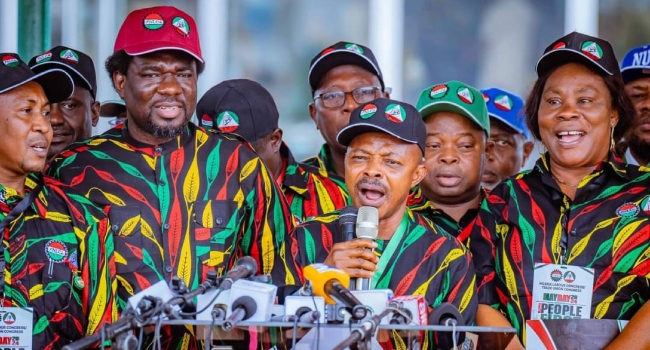President Bola Tinubu will meet with the Organised Labour in Abuja on Thursday to discuss a new minimum wage for Nigerian workers.
According to sources, the President has invited the leadership of the Nigeria Labour Congress (NLC) and Trade Union Congress (TUC) to a meeting scheduled for the Aso Villa in the country’s capital city.
The President is likely to decide on the ₦62,000 proposal from the government and business sector, as well as the ₦250,000 demand from the organised labour.
The Thursday meeting is coming about a month after the President said in his Democracy Day speech on June 12, 2024, that an executive bill on the new national minimum wage for workers would soon be sent to the National Assembly for passage.
On June 25, the Federal Executive Council (FEC) chaired by the President stepped down from consideration and deliberation on the memo on the new minimum wage to allow for more engagement with stakeholders.
Two days after, Tinubu and Vice President Kassim Shettima, at the 141st meeting of the National Economic Council (NEC), met with governors of the 36 states of the Federation and ministers to deliberate on a new minimum wage for workers.
Long Walk To New Wage
Talks for a new minimum wage for Nigerian workers have been on for a while. The Minimum Wage Act of 2019, which made ₦30,000 the minimum wage, expired in April 2024. The Act should be reviewed every five years to meet with contemporary economic demands of workers.
President Bola Tinubu in January set up a Tripartite Committee to negotiate a new minimum wage for workers. The committee comprises the Organised Labour, representatives of federal and state governments as well as the Organised Private Sector.
However, the committee members failed to reach an agreement on a new realistic minimum wage for workers, forcing labour to declare an indefinite industrial action on Monday, June 3, 2024. Businesses were paralysed as labour shut down airports, hospitals, the national grid, banks, National Assembly, and state assemblies’ complexes.
The labour unions said the current minimum wage of ₦30,000 can no longer cater to the well-being of an average Nigerian worker, saying the government should offer workers something economically realistic in tandem with current inflationary pressures, attendant effects of the twin policies of petrol subsidy removal and unification of the forex windows of the current administration.
Labour “relaxed” its strike on June 4, 2024 following assurances from the President that he was committed to a wage above ₦60,000.
Both the Trade Union Congress (TUC) and Nigeria Labour Congress (NLC) leadership subsequently resumed talks with the representatives of the Federal Government, states, and the Organised Private Sector.
On Friday, June 7, 2024, the two sides (labour and the government) still failed to reach an agreement. While labour dropped again its demand from ₦494,000 to ₦250,000, the government added ₦2,000 to its initial ₦60,000 and offered workers ₦62,000.
Both sides submitted their reports to the President who is expected to make a decision and send an executive bill to the National Assembly to pass a new minimum wage bill to be signed into law by the President.



